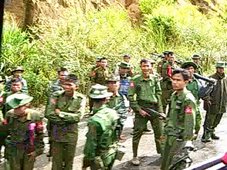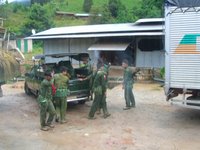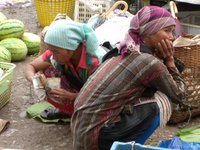 © Copyright 2006 by Blogger Jotman (story and photos). All Rights Reserved.
© Copyright 2006 by Blogger Jotman (story and photos). All Rights Reserved. Last night Dave, Emma, and I were having a drink (names have been changed) on the patio of bar by a quiet street of a town in northern Thailand. A few bugs hovered above our heads near a lamp.
I had met Dave the previous day at my guesthouse. Dave wore his hair long and had a Southern California manner about him. Spotting us from the street, Emma, whom Dave had only met that afternoon, sat down on the bench beside him. Emma wore a silver stud above her chin and large moon shaped earrings. As the evening light faded, her tanned face became more radiant.
We had just been chatting with the restaurant security guard. Smartly dressed in a blue cap and crisp white shirt, anyone would mistake the fifty year old guard for a police officer -- one of half his age. He told us he had been born to a Chinese mother and hill tribe father in Keng Tong, a town deep inside Myanmar’s Shan State which I had recently visited. Just as the guard left to check on something, I heard Emma say something to Dave about a “machine gun.” I glanced at the pair seated across the table from me.
Dave pointed at Emma. “She fires machine guns.”
“What?” I asked incredulously.
What Emma would say next, Dave had not heard before either. Indeed, we were about to hear this petite female tell us something about herself that was almost impossible to believe.
“I spent a year fighting for the Karen resistance army in Myanmar,” Emma said.
Dead silence. Needless to say Dave and I were almost speechless. “I think she’s joking” Dave muttered.
As for the background on her decision to join the army, here is what I was able to piece together from our conversation. Emma told us that at first she had worked with Karen refugees near a town on the Thai border -- a group who taught the Karen how to practice medicine in the jungle. But through a friend in the camp she had been introduced to a general in the Karen resistance army. Emma had the idea that by enlisting with the Karen resistance forces she could make a big difference to this suffering minority people. She told me that Myanmar's army had encroached on Karen villages, and the Karen had been fighting a defensive war to protect their home territory. After two months of boot camp, Emma was off fighting in the Burmese jungle.
“Did you shoot anybody?” I asked
“People always ask me that. And I don’t know,” Emma said. “In the confusion of a battle, you simply don’t know.”
It seems Emma had seen fighting quite frequently -- the longest stretch during which she saw no combat having lasted only a month and a half. In combat, she spoke of how the enemy line and her own side’s line would be mingled together. But she said she could always tell the two sides apart.
In the Burmese jungle the army subsisted mostly on a diet of rice and salt.
“Sometimes other soldiers caught rats, bugs, and whatever else they could catch in the jungle” she said. A vegan, Emma just ate the rice.
I asked her what kind of wild animals she had come across in the jungle.
“There were snakes -- really big snakes.”
“What about casualties?” I asked.
Emma said that although there were a couple fatalities, most of the casualties her platoon suffered had been leg injuries, related to land mines. She said the Myanmar army had planted mines that were of Chinese and Myanmar origin, and some others were hand made devices.
"The Myanmar army placed mines and left them. The Karen use mines too, but we always picked them up afterwards. Like when we camped in a village, we would put mines around the perimeter to protect the village. Then when we left, we picked up the mines we had placed,” she said.
 In a previous posting I related my own observations of a Myanmar army battalion on the move and referred to a recent report describing the state of the army. I asked her if the Myanmar troops were indeed badly equipped.
In a previous posting I related my own observations of a Myanmar army battalion on the move and referred to a recent report describing the state of the army. I asked her if the Myanmar troops were indeed badly equipped.“Yes, compared to a Western army they certainly are. But not compared to the resistance fighters, who are worse equipped. The Myanmar army has tanks, but they can’t use them up in the that region -- there are no roads.” She said the resistance used mostly old American weapons.
When Emma smiled, rows of straight white teeth gleamed in the darkness.
Emma said that during one battle, “There was actually a guy on our side who was talking on the radio to his brother who fought for the other side.”
“Brother against brother,” Dave said. Dave’s ancestors had fought in the US Civil War.
That guy’s brother, she explained, wasn’t exactly a part of the Myanmar army. Rather, he was fighting for a different mountain tribe. The Myanmar troops were allied with an enemy of the Karen. And the soldiers from this other ethnic group had been promised a share of any land taken from the Karen. But Emma said that the price these people paid for cooperating with the Myanmar army was that they had to fight at the front of the Myanmar army line.
"What really moved me," Emma said, "was one day when we were preparing to launch an attack on an enemy camp I got up so close to the enemy. I saw the Myanmar troops sitting around talking. I could hear what they were saying: they were talking about girls. They were only boys. I realized something at that moment; how they were not so different from my side -- that it was not their choice to be fighting this war."
We decided to take a walk. Emma had not eaten dinner and she hoped to find some street food. We passed some stalls. “Only meats” Emma scowled. Finally, spotting a cart loaded with a steaming pile of corn-on-the-cob, Emma said, “I’m going to buy some corn.”
We walked further: Emma now wanted to buy some durian -- a large fruit resembling a bloated pineapple that has the taste, smell, and texture of brie cheese. The smell is considered so offensive that it’s forbidden even to carry the fruit on the subway in Singapore.
“Durian’s also banned on the Bangkok skytrain” said Dave.
 “Were there other women in the Karen army?” I asked.
“Were there other women in the Karen army?” I asked.“There were some nurses. But I was the only woman fighting.” She added, “The general who allowed me to enlist had the idea that by letting me join, I could be an example for Karen women. It might encourage them to sign up.”
But first some deep seated cultural issues would have to be resolved.
“The Burmese have these… well these cultural… oddities. In Burmese society, it is forbidden for a woman to be above a man, or for a woman to step over a man. Can you imagine? I’m not supposed to step over a man’s leg! So being in combat situations, obviously, this would not work. I told them I wouldn’t accept such restrictions. I said, ‘See that plane flying above you? There are women in that plane. You are already standing below some women.’ But my arguments did not convince them.
“So what happened?”
“Finally one of the army leaders came up with a solution to the problem,” she said. “It was decided that I was a man, and should be treated as a man.”
Dave and I looked at Emma. She was very much a woman.
“That must have got in the way of sex,” said Dave.
“Not at all,” she said with a wink.

No comments:
Post a Comment
Because all comments on this blog are moderated, there will be some delay before your comment is approved.